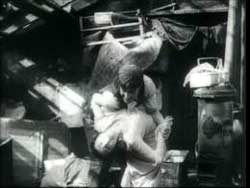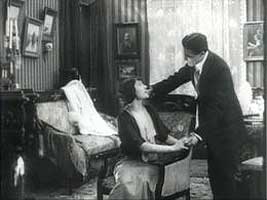Russian director Yevgeni Bauer made many films very quickly back to back bewtween 1913 & 1917 when he unexpectedly died of pneumonia. His short filmmaking career was sufficient to make him in some critics' mind one of the two or three greatest silent film directors of his country, & of the whole world.
Twilight of a Woman's Soul (Sumerki zhenskoi dush, 1913) was his first film, & he does seem to have sprung into the film industry with as much skill & ability as could be imagined at such an early date in cinematic history.
Vera Dubovskaia (Nina Chernova) is young, beautiful, & wealthy, but afflicted with loneliness even while her luxurious residence serves as salon with many attendees. Her mother the Countess Dubovskaia, weary of seeing her daughter moping, insists she go with her on "rounds" during volunteer work for the poor.
 The poor are depicted as gamblers & drunkards, whereas the generous upper classes are deeply concerned for the well-being of the lower classes. Maxim Petrov (V. Demert) lives in a squallid little room he doesn't bother to keep tidy, because the poor are just naturally dirty. The poor are depicted as gamblers & drunkards, whereas the generous upper classes are deeply concerned for the well-being of the lower classes. Maxim Petrov (V. Demert) lives in a squallid little room he doesn't bother to keep tidy, because the poor are just naturally dirty.
Vera decides to devote her life to the needy. Maxim detecting a push-over writes her a pitiful letter of deep needfulness, pretending to crippling injury, & laughing his ass off as he makes this stuff up.
It may not have been the filmmaker's intent, but what he has achieved is a warning that delicate flowers of nobility are at considerable risk due to their misguided liberality & goodness in wishing to assist the lower classes who deserve no such good will.
Such imbalanced stereotypes were still possible in a 1913 Russian silent film, five years before the Russian Revolution. Soon enough the depiction of aristocrats' decency assaulted by the unwholesomeness of the poor would not be as easily promulgated in Russian entertainments, which would prefer the reverse stereotype of the devouring rich stomping on the necks of the salt of the earth.
Having received the letter by the novel method of Maxim breaking into her house & leaving it near her bed, idiot Vera thinks it not at all odd that he has been in her room as she slept. She is moved by his whinging letter. That very morning she packs her little red riding hood basket.
Telling no one where she is going, she sets off for the squalid room of the big bad wolf, happy as a flower, not noticing Maxim stalks secretly at her back all the way from her house to his tenement.
Even after he rapes her she unpacks her goodwill basket handing him his meal, with a look of terror. She then permits him to drag her to the floor a second time. Like Judith in the tent of her enemy. When Maxim passes out drunk (from vodka which, it appears, she herself brought along for him, moron that she is), she whips out a bread knife & stabs him in the head. Cool.
Already a mopy introverted brat, she now bares the secret of her ruin, a despoiled woman, for all time unfit for marriage & motherhood & happiness.
Vera meets Prince Sergei Dolskii (A. Ugrjumov), a young, elegant, manly master of the fence, crack shot with a pistol, & mannerly as all get out.
They're soon in love but she is afflicted by a bad conscience, knowing she is unfit to wed such a fine fellow. After his marriage proposal, she staggers about the room in silent film postures of abject horror, not exactly the response the prince had hoped for.
There are no dialog cards to state clearly what's going on, but it looks like her father & mother intervene in favor of the match, she tosses her arms about refusing adamantly, & the prince storms out peevish & annoyed. Vera instantly takes to her sick bed surrounded by flowers, when unexpectedly Sergei returns, having heard she's near death. In the light of his manly forgiveness, she with great ease recovers.
She decides to reveal her secret to Sergei. He starts pawing her when they are alone, but she fends him off, insisting she must tell him something awful about her past. He says nothing of her past could change his love, & refuses to let her speak.
On the eve before the wedding she sends him a letter about having experienced a fate worth than death, leaving out that she murdered the bastard since that wasn't important, it was only some dirty peasant after all, not something significant like a dog or a human being.
Alas the letter cannot be delivered & is returned to her unopened, for the prince has been summoned to his estate & shall be in transit until near time for the wedding.
After they are married she finally gets round to declaring herself unfit & he quite agrees. Obviously she thought by declaring herself a lowly worm of no value as a wife she expected him to hold her & say she's not at all a worm.
Instead, Sergei hugs his own head & staggers about the room then stands at a distance looking horrified at the vile spoiled melon upon which he nearly feasted. He wants no more to do with her. As his new bride leaves, she actually works up the gumption to stand up for herself, saying, "I pity you prince."
Such a dumbass story would be truly annoying if it weren't so inadvertently funny. Had not the classism of the tale been so in favor of gentry & villainizing the poor, it might've come off as a tale of the injustice of blaming the victims of rape as the cause of their own misfortune. But since the audience never for a moment questions the injustice, the real message is "don't try to feed to the poor, they'll bite your hand."
The prince dulls his misery by becoming a drunk & by womanizing since what's ruinous for the goose is perfectly acceptable for the gander. After a year of constant unhappiness he is ready to beg for Vera's forgiveness. But she has "gone abroad" leaving no address. The prince sets out travelling to find her, but gives up after two years & returns home.
Under an assumed name, Vera has become an actress who parades her beauty on the boards. Rising in her profession, her troupe begins performing in all the great capitols of Europe. Eventually the troupe makes it to Moscow with La Traviata starring "Ellen Kay."
The Prince happens to attend & through his opera glasses recognizes Ellen Kay as his estranged wife of three years. She receives him in her dressing room rather coldly. "It's too late, Prince! I loved you once. Now my love has been extinguished."
In the end, it is indeed the prince we are most asked to pity. And for that time & place, this is quite an advanced attitude toward women, that even after being "despoiled" a woman might go on to signal success, & a man's condemning attitude against such a woman will ultimately destroy his life.
copyright © by Paghat the Ratgirl
|

 The poor are depicted as gamblers & drunkards, whereas the generous upper classes are deeply concerned for the well-being of the lower classes. Maxim Petrov (V. Demert) lives in a squallid little room he doesn't bother to keep tidy, because the poor are just naturally dirty.
The poor are depicted as gamblers & drunkards, whereas the generous upper classes are deeply concerned for the well-being of the lower classes. Maxim Petrov (V. Demert) lives in a squallid little room he doesn't bother to keep tidy, because the poor are just naturally dirty.